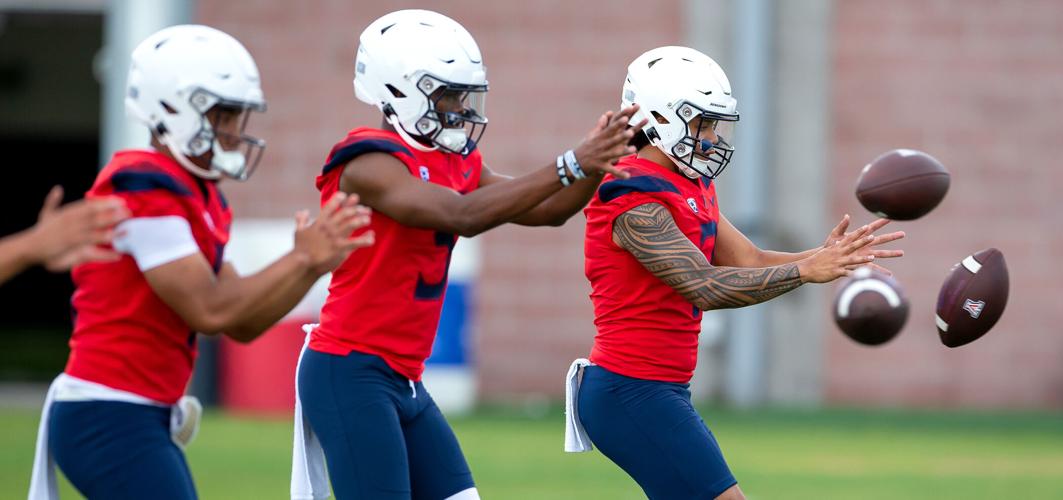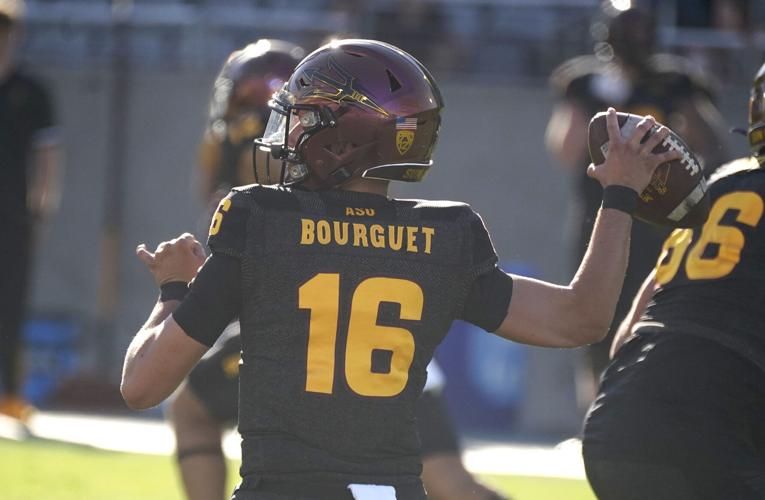Welcome to our third and final assessment of Pac-12 quarterback depth in 2022.
To determine the Quarterback Comfort Quotient for each team (QBCQ), we consider the caliber of the starter and the reliability of the backups.
After all, the second stringer is the least important player on the roster until he’s the most important.
Please note: Not all backups are listed below, only those we believe are relevant for 2022.
We previously assessed each team’s QBCQ in February at the beginning of the offseason, and in May after spring practices.
1. UCLA
Projected starter: Dorian Thompson-Robinson
Top backup: Ethan Garbers
Other options: Chase Griffin, Justyn Martin
Comment: Thompson-Robinson was an all-Pac-12 selection last year and should play at a high level again, especially with the running game easing the pressure on him to constantly make plays. And if Thompson-Robinson isn’t available, the Bruins have at least two options: Garbers is one of the best backups in the conference; Griffin has starting experience; and Martin was a coveted recruit with significant upside.
2. Utah
Projected starter: Cameron Rising
Top backup: Bryson Barnes
Other options: Ja’Quiden Jackson
Comment: Good example of the subjectivity at the foundation of this exercise: Rising would not rate in the top three if we were assessing only projected starters, and Barnes would be on the second tier of backups based on his limited experience. But add ingredients like leadership, durability, poise and clutch play, and our QBCQ algorithm ranks Utah’s combination near the top.
3. USC
Projected starter: Caleb Williams
Top backup: Miller Moss
Other options: Jake Jensen
Comment: There is a scenario, entirely plausible, in which Williams takes every meaningful snap, performs at a Heisman level and USC’s quarterback play laps the field. But we don’t view that as the most likely outcome, partly because of the potential for Williams to experience stretches of inefficiency. If Moss had attempted 130 passes, instead of just 13, we’d probably slot the Trojans in the top spot.
4. Arizona
Projected starter: Jayden de Laura
Top backup: Jordan McCloud
Other options: Noah Fifita, Gunner Cruz
Comment: The Wildcats have upgraded their quarterback room substantially with regard to the quality of the starter and the reliability of the backup. De Laura played at an all-conference level at Washington State while McCloud, who has 500 career attempts at Arizona and USF, is listed as an “or” on the depth chart alongside Fifita. The challenge is keeping them upright, and healthy.
5. Washington
Projected starter: Michael Penix Jr.
Top backup: Dylan Morris
Other options: Sam Huard
Comment: Morris’ return was somewhat surprising but indisputably important. He provides an experienced option behind an oft-injured starter and gives the Huskies the luxury of slotting a former five-star recruit into the No. 3 role. But quality depth is merely one piece of the QBCQ; high-level play from the starter matters, too. Will Penix (or Morris) deliver? We’re slightly skeptical.
6. Stanford
Projected starter: Tanner McKee
Top backup: Ari Patu
Other options: Ashton Daniels
Comment: McKee enters ‘22 as the top NFL prospect in the conference (at his position), but the combination of skinny frame, modest mobility and questionable offensive line makes us wonder about his durability. Meanwhile, Patu has attempted just 16 passes, and Daniels is a true freshman. A classic QBCQ case study: The Cardinal has no reason to fret over its quarterbacks, unless it has reason to panic.
7. Oregon
Projected starter: Bo Nix
Top backup: Ty Thompson
Other options: Jay Butterfield
Comment: No team in the conference has a wider range of potential outcomes for its quarterback play. Nix might thrive with the scenery change from Auburn, but we need to see it: He never completed more than 61 percent of his passes, and his yards-per-attempt last season (7.1) was one of the lowest in the Power Five. Meanwhile, Thompson is a gifted but inexperienced backup.
8. Arizona State
Projected starter: Emory Jones
Top backup: Trenton Bourget
Other options: Paul Tyson
Comment: Given the state of the quarterback depth following Jayden Daniels’ departure, the Sun Devils have fortified impressively. Jones threw 346 passes last year at Florida and faced both Georgia and Alabama (with mixed results, not surprisingly). His mobility and savvy will serve ASU well, but we prefer the wait-and-see approach. And if he gets hurt, there’s big trouble.
9. Washington State
Projected starter: Cam Ward
Top backup: Xavier Ward
Other options: John Mateer
Comment: Cam Ward is vastly more talented than his background (Incarnate Word) suggests and could have a Gardner Minshew-level impact considering his familiarity with the offense. That said, we expect uneven play as he adjusts to the speed of Pac-12 defenses. And the offensive line looks wobbly. And neither Xavier Ward (no relation to Cam) or Mateer has game experience.
10. Oregon State
Projected starter: Chance Nolan
Top backup: Ben Gulbranson
Other options: Tristan Gebbia
Comment: Nolan was merely solid last season (19 touchdowns, 10 interceptions) and benefitted from a first-class running game that might lose steam this season given the attrition up front. Gebbia is a former starter, which counts for something, but he hasn’t played in two years because of a hamstring injury. And Gulbranson, while gifted, has limited experience.
11. Cal
Projected starter: Jack Plummer
Top backup: Kai Millner
Other options: Zach Johnson
Comment: Admittedly, this projection could look silly by November if Plummer emerges as a top-tier passer. But our view is the following: Cal’s first-stringer was benched midway through last season at Purdue, and its backup is a redshirt freshman. On paper, that combination doesn’t engender much confidence, especially when the surrounding playmakers don’t qualify as elite.
12. Colorado
Projected starter: Brendon Lewis
Top backup: JT Shrout
Other options: Owen McCown, Drew Carter
Comment: The Buffaloes have not officially named Lewis the starter — that designation is merely our guess. No doubt, there is some gamesmanship at play in keeping the decision secret from the Week One opponent, TCU. But the situation underscores the fact that CU does not have a clear No. 1. Lewis was erratic last year as a freshman while Shrout, a Tennessee transfer, missed ’21 with a knee injury.





